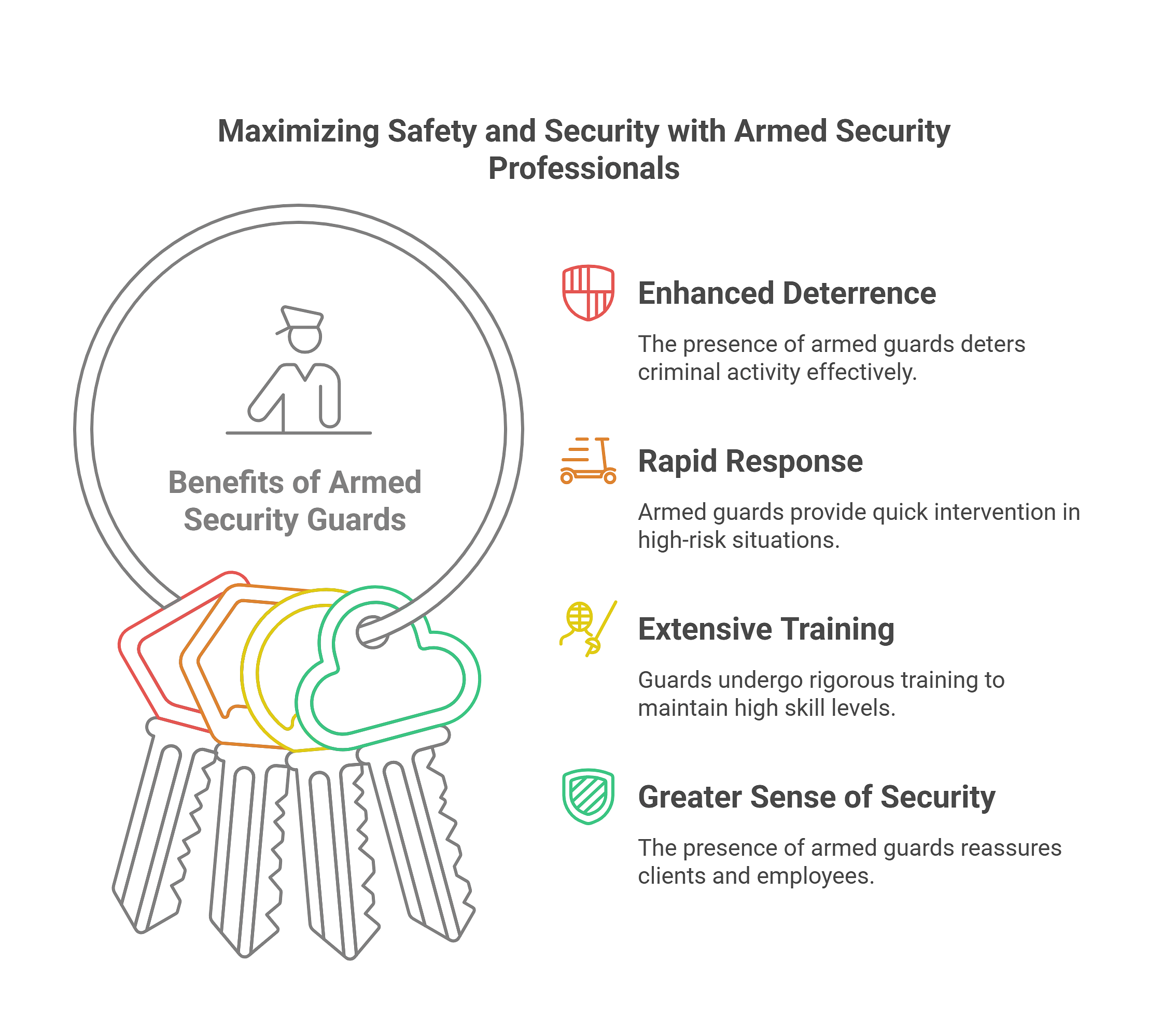
The Benefits of Armed vs. Unarmed Security Guards
In an ever-evolving world, the need to safeguard people, property, and valuable resources has never been more critical. Businesses across all industries face growing security challenges, from petty theft to more sophisticated criminal threats. This heightened level of risk underscores the importance of choosing the right security solutions, which often involves deciding between armed and unarmed security guards.
Selecting the appropriate level of protection goes beyond simply hiring personnel. It requires a thorough understanding of the environment, budget considerations, legal requirements, and the overall organizational culture. At Top Gun Bodyguard, Investigations & Security Consulting, we recognize that no two clients have the exact same needs. By offering both armed and unarmed security services, we aim to provide customized solutions that align with each client’s risk profile and operational goals.
Understanding Armed vs. Unarmed Security Guards
Before choosing between an armed or unarmed security presence, it is essential to understand what each option entails. Armed security guards come equipped with firearms and the training necessary to use them responsibly, while unarmed security guards focus on protection through visibility, deterrence, and non-lethal methods. The following sections outline the distinctions between these two approaches to security so you can make an informed decision.
Definition of Armed Security Guards

Armed security guards are professionals who have undergone extensive background checks, rigorous firearms training, and certification processes to ensure they can handle weapons safely. They typically work in high-risk environments or situations involving valuable assets, sensitive data, or high-profile individuals. Their primary advantage lies in their ability to respond rapidly to serious threats. The visible presence of a firearm also acts as a strong deterrent to potential criminals. Armed guards are well-versed in crowd control, emergency protocols, and de-escalation tactics; however, their role often comes with higher insurance costs and stricter regulatory requirements.
Definition of Unarmed Security Guards
Unarmed security guards, on the other hand, rely on visibility, communication skills, and conflict-resolution techniques to maintain order. Their day-to-day duties might involve monitoring entrances and exits, checking identification, and patrolling designated areas. For businesses or events aiming to create a more welcoming or relaxed atmosphere, unarmed guards are ideal because they provide a sense of security without the inherent intimidation factor of firearms. They are also less likely to face substantial liability issues, which can be beneficial for organizations seeking a lower-risk and more cost-effective security solution. Unarmed guards typically receive training in situational awareness, first aid, and basic self-defense, ensuring they can swiftly address any issues that arise without resorting to lethal force.
Benefits of Armed Security Guards

1. Enhanced Deterrence
Armed security guards carry a visible and powerful means of defense, which can significantly deter criminal activity. The mere presence of a firearm often discourages would-be offenders from attempting thefts, assaults, or other forms of misconduct. This heightened level of deterrence is especially valuable in high-risk environments, such as financial institutions or locations with valuable assets, where the stakes of an intrusion can be critically high.
2. Rapid Response in High-Risk Environments
In situations where threats escalate quickly or involve violent individuals, armed guards can intervene more effectively. Their specialized training and access to defensive tools enable them to address active threats and protect innocent bystanders. This capability is particularly beneficial for businesses operating in locations with higher crime rates or those that manage sensitive information and high-value goods, where immediate action can prevent significant losses or harm.
3. Extensive Training and Expertise
Armed security professionals must undergo stringent certification processes, firearms training, and ongoing education to maintain their skills. This formal preparation includes learning about weapon safety, emergency response protocols, and de-escalation techniques. Because they are continually tested and retrained, armed guards can adapt to emerging threats, use sound judgment in high-pressure scenarios, and uphold strict standards of professionalism.
4. Greater Sense of Security for Clients
The knowledge that an armed professional is on-site can offer peace of mind to employees, customers, and stakeholders. This added layer of protection is especially reassuring in environments where the perceived risk is higher, such as government buildings, hospitals, or industrial facilities. By instilling confidence in the security measures in place, armed guards play a crucial role in supporting overall business continuity and boosting the morale of everyone within a protected space.
Benefits of Unarmed Security Guards
1. Approachability and Reduced Liability
Unarmed security guards often present a more welcoming image, which can be essential for businesses aiming to foster positive customer experiences. Their presence can feel less intimidating than armed counterparts, making it easier for visitors, clients, and staff to approach them for assistance. Additionally, with no firearms on-site, organizations may benefit from lowered insurance costs and reduced legal complications.
2. Conflict De-escalation and Non-lethal Skills
Without the option of using a firearm, unarmed guards rely heavily on communication techniques, conflict resolution, and physical presence to defuse tense situations. Their training typically emphasizes negotiation, empathy, and situational awareness, enabling them to handle disputes or disturbances without resorting to force. This skill set is highly valuable in environments like retail stores, corporate offices, and schools, where a calm, measured approach can often solve problems more effectively.
3. Cost-Effectiveness
Unarmed security services generally come with lower operational expenses. The absence of firearms training and equipment can reduce hourly rates and insurance premiums, which is particularly important for smaller businesses or those with limited budgets. By opting for unarmed security, organizations can still maintain a professional level of protection while keeping overhead costs manageable.
4. Positive Public Relations
For businesses or institutions that prioritize a friendly public image, unarmed guards can help cultivate trust and goodwill. Visitors and customers may feel more at ease, associating a lower-intensity security presence with an environment that prioritizes open communication and community well-being. This approach is especially beneficial for companies that value a people-first brand identity, as it aligns security measures with their overall organizational culture.
Factors to Consider When Choosing Between Armed and Unarmed
Choosing the right security solution is about understanding your specific needs, environment, and organizational goals. By carefully evaluating risk levels, budget constraints, and public perception, you can determine which security approach best aligns with your objectives. Below are several key factors to guide your decision-making process.
Nature of the Environment or Facility
Your industry, location, and the general security climate surrounding your facility play significant roles in deciding between armed or unarmed security. For instance, locations storing high-value goods or sensitive information, such as jewelry stores or data centers, might benefit from the deterring presence of an armed guard. Conversely, environments like retail shops, corporate offices, or educational institutions, where a more relaxed atmosphere is desired, often find unarmed security sufficient to address common threats while maintaining a welcoming tone.
Budget and Cost Constraints
Cost is another crucial consideration. Armed security typically involves higher hourly rates, additional training requirements, and elevated insurance premiums. If you’re operating on a tight budget, unarmed security may offer a more financially sustainable alternative. At the same time, it’s important to weigh the cost savings against the potential risks of having a less formidable deterrent in certain high-risk scenarios. Striking the right balance ensures you don’t compromise on critical safety measures while staying mindful of overall expenditures.
Legal and Insurance Implications
Different states and localities have varying regulations regarding firearms, training, and licensing for armed guards. Complying with these laws can be time-consuming and may require continuous education or permit renewals. In addition, maintaining proper insurance coverage for an armed security detail can be more complex and costly. Before choosing armed security, be sure to research your local regulations and consult with insurance providers to understand the full scope of liability and compliance issues.
Company Culture and Public Perception
Every organization has a unique identity, brand image, and culture. How you want to be perceived by employees, customers, and the wider community should influence your security strategy. An armed guard may project a strong image of protection, but it could also heighten tensions for some customers or staff. In contrast, unarmed security might be more approachable and less intimidating, aligning better with a company culture that values open communication and a welcoming environment. Determining how either option impacts your reputation and daily operations is a critical step in the decision process.
Aim High for a Safer Tomorrow
If you’re ready to strengthen your security posture and protect what matters most, Top Gun Bodyguard, Investigations & Security Consulting is here to help. Our expert team specializes in crafting tailored security plans that align with your specific goals, environment, and budget. We’ll work with you to ensure that your choice between armed or unarmed personnel truly meets your needs and safeguards your operations. Get in touch with us today to learn how we can help you aim high and take your security to the next level.
Frequently Asked Questions (FAQs)
Do armed security guards have the authority to make arrests?
While they can detain individuals in certain situations, armed security guards are not law enforcement and typically can only make a citizen’s arrest when legally justified.
Are unarmed security guards effective in high-crime areas?
Unarmed guards can be effective in high-crime areas when paired with strong surveillance systems and rapid response protocols, but armed guards may offer a stronger deterrent.
What qualifications are required to become an armed security guard?
Armed guards must complete firearms training, pass background checks, and obtain state-issued licenses or certifications, which vary by location.
Can businesses switch from unarmed to armed security later on?
Yes, many companies start with unarmed guards and upgrade to armed security as their risk level or security needs evolve, often after a professional assessment.

